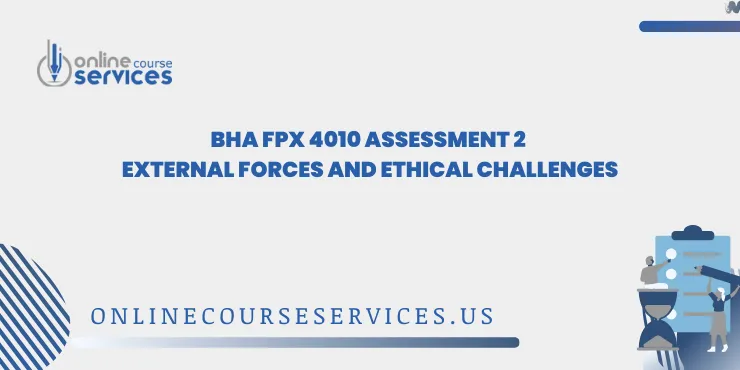- BHA FPX 4010 Assessment 2 External Forces and Ethical Challenges.
External Forces and Ethical Challenges
Changes in real money-related and external forces impact clinical benefits in various ways. A few challenges are the amount of healthcare affiliations required, the openness of healthcare providers, and healthcare working conditions due to the cost of affiliations. The healthcare business and managed care can be impacted by constantly moving events.
Managed Care
The most expansive kind of clinical care combined is managed care. Clinical care plans were made during the 1980s to provide decency and better energetic care while controlling clinical advantages and costs and expanding capability. The BHA FPX 4010 Assessment 2 External Forces and Ethical Challenges highlight how managed care plans have significantly impacted healthcare by offering access to healthcare at a lower price and providing comprehensive care and affiliations (Morrison et al., 2019). Regardless of the advancements related to these plans that have fostered improvements, there are a few unfavourable results that these plans have created in the healthcare business.
One concern is the impediments to providing access, as patients are restricted in where they can get care (Shrank et al., 2018). Managed care plans are inclined toward provider relationships and require their families to stay inside their relationships for affiliations. Managed care patients can see out-of-network providers for care; regardless of whether they choose to see an out-of-network provider, they should pay a solitary cost for affiliations. References are another issue that patients with a managed care plan look at.
Ethical Challenges in Managed Care
Specialists recommending patients under a managed care plan should consider the patient’s prosperity plan before referring them to a specialist to avoid the patient paying individual costs. Managed care plans permit sensible flourishing ideas for overwhelmingly most, yet they impact the healthcare business by restricting in-network affiliations, providers, and workplaces. Research shows that managed care thought has expanded from half to 70% all through late years by 2019 (MACPAC, 2022).
With the extension of patients and cutoff points on providers, healthcare specialists face ethical challenges while making patient treatment game plans. A moral test in the managed care industry is receptiveness (Vrijhoef et al., 2022). As a healthcare fit, obstructions on clinical providers cause stress when picking the right course of treatment for a patient. Ethically, healthcare specialists should adhere to freedom, regard, non-malevolence, and worth (Morrison et al., 2019).
While making a game arrangement of care or a treatment plan for patients, these endpoints strain as the insignificance of patients to unequivocal providers for workspaces for genuine treatment is an ethical quandary. By coordinating and keeping the cost of healthcare low to increase capability, healthcare specialists face the trouble of picking between the care required and the affiliations open to the patient inside their assurance plan.
Recommendations
The challenges that went up against managed care are complex and will take time to fix. Notwithstanding, a few movements can be executed to help lessen the ethical concerns we face. Transient strategies that can be executed to keep ethical issues with patient treatment plans are supporting providers contemplating a patient’s requirement for care, allowing patients to search for therapy for difficulties, and paying little brain to what the educated authority can lessen ethical issues in the healthcare business.
Broadened length frameworks that the managed care plans can execute to help assist with these challenges are, little by little, expanding the managed care relationship to smashing care needs. The providers can supply documentation to the protection affiliation showing up.
Improving Managed Care Accessibility
The requirement for care is to ensure that out-of-network costs are covered. Expanding the straightforwardness of in-network providers and workplaces can lessen treatment plan issues and allow patients to care with unessential tangles and impedances. Increasing the number of open providers will diminish ethical concerns for healthcare specialists while determining a patient’s course of treatment.
Making the embraced method changes to the managed care plans will expand the agreement to healthcare by allowing patients to search for bona fide treatment considering their contaminations and not based it on cost or a relationship of providers. The cost of affiliations can be managed and controlled inside the managed care designs, decreasing ethical quandaries with patient care.
Conclusion
Managed care plans have generally besides evolved healthcare relationships for explicit patients. Unfortunately, the healthcare plans’ obstacles to open providers can baffle the ability to get genuine care and cause ethical concerns for clinical specialists making care arrangements for their patients. By offering more open in-network providers, healthcare specialists can make a typical technique for care or treatment for their patients, pondering their fundamentals and not solely on the open in-network providers.
Expanding the managed care plan alliance can continue to manage the cost of the relationship, as the security plan can allow patients who need an outside relationship to go to out-of-orchestrate providers. The BHA FPX 4010 Assessment 2 External Forces and Ethical Challenges emphasizes that not all patients use out-of-network providers, primarily those requiring expanded care. In clinical benefits, one ought to apply a higher ethical standard while understanding the need to make an addition (Morrison et al., 2019).
References
Morrison, E. E. (2019). Ethics in Health Administration: A Practical Approach for Decision Makers (4th ed.). Jones & Bartlett Learning. https://capella.vitalsource.com/books/9781284194319
Medicaid Managed Care Capitation Rate Setting : (2022, March 10). MACPAC https://www.macpac.gov/publication/medicaid-managed-care-capitation-rate-setting/
Shrank, W. H., Keyser, D. J., & Lovelace, J. G. (2018). Redistributing Investment in Health and Social Services-The evolving role of managed care. JAMA: The Journal of the American Medical Association, 320(21), 2197–2198. https://doi.org/10.1001/jama.2018.14987
Vrijhoef, H. J. M. (2022). The Future of Coordination is Smart Coordination. International Journal of Care Coordination, 25(1), 3-4. https://doi.org/10.1177/20534345221075661
Ethical Issues in Managed Care. (n.d.). https://www.amihm.org/ethical-issues-in-managed-care/

